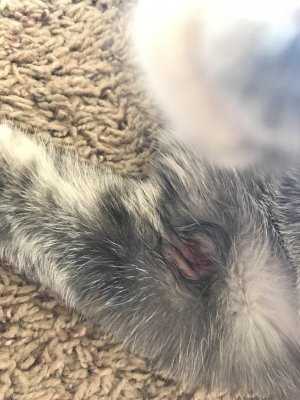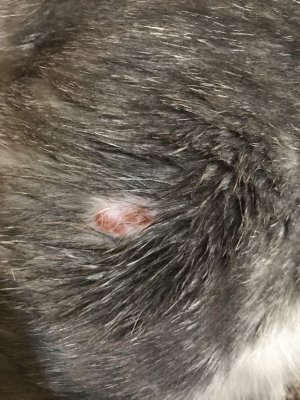Hi,
Coming here because I've had 3 trips to the vet for skin lesions on my cat that have still not been properly diagnosed (as each treatment has not gotten rid of the problem). I adopted Daisy in June and noticed a skin lesion on her leg 3 days after I got her. First vet visit, they thought it was a cat bite. It started healing, but then she excessively licked it and made it a deeper wound. This started the long cycle of using an soft E-collar to keep her from licking it.
Took her E-collar off after about 2 weeks, and she went back to licking it and it came back. I also noticed during this time another wound under her arm that looked similar. She then became obsessed with this one and would obsessively lick it as well. Went back to the vet, they weren't sure, so they gave me an antibiotic cream and told me to keep her on the E-collar. Another 2 weeks pass by, and the wound is not healed and she will go right back for it if I take her cone off for even just a second.
Last week was our third vet visit. She is now on Clindamycin and Intrafungol to treat for any resistant bacteria and potential ringworm. These treatments will last up to a month.
Things I'm worried about/why I am here:
-I'm afraid this whole process has created a behavioral habit of wanting to lick these areas--that even if they start to heal from the antibiotics, that she will instinctively go back to these spots no matter what and create new wounds.
-She's been on a soft E-collar now for over a month and I'm considered about how it is affecting her psychologically. I cannot keep her off of it without my supervision, otherwise she will lick the wounds until they are completely raw and open.
-Afraid that this current round of antibiotics won't do anything and I'm back to square one. But more overwhelmed and hundreds of dollars wasted on treatments that aren't working.
I guess I'm just looking for reassurance or advice about how to deal with this. I'm a broke graduate student that got a kitty for support and comfort, and while I love her so much and only want to help her, this has also caused an immense amount of anxiety and stress for me. And I'm at a bit of a breaking point with my sweet kitty. Any help/advice/words of wisdom are greatly appreciated.


Coming here because I've had 3 trips to the vet for skin lesions on my cat that have still not been properly diagnosed (as each treatment has not gotten rid of the problem). I adopted Daisy in June and noticed a skin lesion on her leg 3 days after I got her. First vet visit, they thought it was a cat bite. It started healing, but then she excessively licked it and made it a deeper wound. This started the long cycle of using an soft E-collar to keep her from licking it.
Took her E-collar off after about 2 weeks, and she went back to licking it and it came back. I also noticed during this time another wound under her arm that looked similar. She then became obsessed with this one and would obsessively lick it as well. Went back to the vet, they weren't sure, so they gave me an antibiotic cream and told me to keep her on the E-collar. Another 2 weeks pass by, and the wound is not healed and she will go right back for it if I take her cone off for even just a second.
Last week was our third vet visit. She is now on Clindamycin and Intrafungol to treat for any resistant bacteria and potential ringworm. These treatments will last up to a month.
Things I'm worried about/why I am here:
-I'm afraid this whole process has created a behavioral habit of wanting to lick these areas--that even if they start to heal from the antibiotics, that she will instinctively go back to these spots no matter what and create new wounds.
-She's been on a soft E-collar now for over a month and I'm considered about how it is affecting her psychologically. I cannot keep her off of it without my supervision, otherwise she will lick the wounds until they are completely raw and open.
-Afraid that this current round of antibiotics won't do anything and I'm back to square one. But more overwhelmed and hundreds of dollars wasted on treatments that aren't working.
I guess I'm just looking for reassurance or advice about how to deal with this. I'm a broke graduate student that got a kitty for support and comfort, and while I love her so much and only want to help her, this has also caused an immense amount of anxiety and stress for me. And I'm at a bit of a breaking point with my sweet kitty. Any help/advice/words of wisdom are greatly appreciated.





